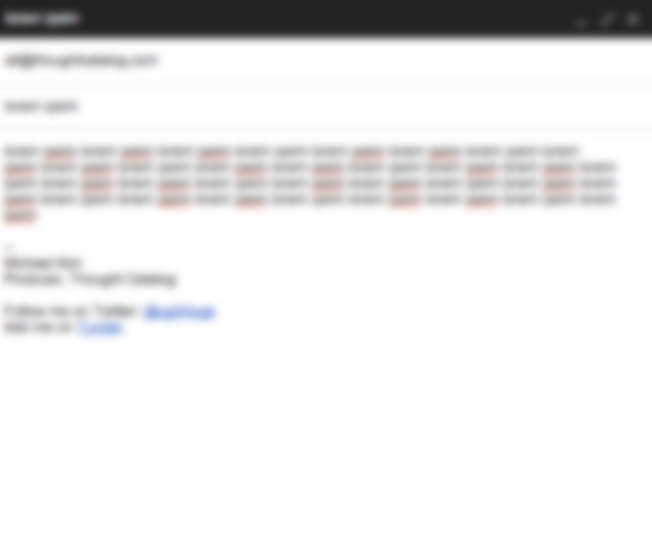
8 Annoying Steps For Writing A Professional Email
Email is weird, especially professional emails. Unlike text messages or tweets, you can’t just write a quick line getting straight to the point.
Email is weird, especially professional emails. Unlike text messages or tweets, you can’t just write a quick line getting straight to the point. You have to be polite, formal and use paragraphs. Writing an email is almost like crafting a masterpiece. One misplaced sentence, one ill-fitting punctuation mark, one overused or outdated closing can destroy it all. There’s science to this shit. Whether your email is for your work contacts or a potential employer, it’s never a relaxing experience. I’m ashamed to tell you how many minutes (hours) I’ve spent writing a job application email. It always feels like sending a message in a bottle. After clicking send, there’s no coming back.
Let’s write an email.
1. Subject line
This is the most annoying part, especially if this is a proposal or job application email. You can’t put “Junior Editor Position Application” because, you know, everyone else is writing the same thing. We’re always told to create an attention-grabber but somehow “PLEASE HIRE ME!” doesn’t work. Hm. Maybe that’s why I didn’t get that call back.
2. Salutation
The greeting: aka the next most annoying element in email writing. If it’s a co-worker you are writing to, “Hello” can sound too cold. If it’s a boss or employer, “Hey” sounds too casual. Am I the only one who feels like a shy teenage girl when using “Hi?” Then there’s the method of just stating the person’s name, which causes another dilemma: Is it Mr. Alex Clark, Mr. Clark, or just Alex? Is Alex even a Mr.?
3. “Hope all is well”
At this point it’s like you’re appeasing the gods. After creating a click-worthy subject line and addressing the almighty recipient(s) in the correct manner, we must now inquire about their wellbeing. It’s so annoying because the reader knows damn well you don’t really care about his or her wellbeing. There has got to be an alternative to “Hope all is well” or “Hope this finds you well.” I sometimes try to be a little clever and say “Hope you are having a great day/week” but then that’s too long. Asking “How are you?” right before jumping into your proposal is even more disingenuous. It’s not like you’re actually awaiting a response to the question.
4. Introducing yourself or the subject matter in two words or less
Now let’s get to the real point, however, you’ve only got a few sentences to do this. We live in an era where #TLDNR applies even in the corporate world. It’s so necessary for the recipient to know of you or your company’s strong background but a detailed explanation can cost you two extra sentences. Thank God for hyperlinks. Sure you can direct them to your site for more info, but then it’s like, what if they don’t click it?!
5. Emoting emotion and defining your tone
Nothing is worse than having your tone misconstrued through text. In email, “LOL” can’t save you and you are allotted only one exclamation point per message. Since professional email is so formal, it’s really easy to come off as an asshole, especially if your email is a serious or urgent request. A simple statement can be mistaken for shade. If only it was cool to write, “Please advise. :-)”
6. The goodbye
Never can say goodbye, no no no…hell no. You can’t say goodbye without reiterating yourself. Obviously the reader is smart enough to know what this email is about from the intro but somehow your email won’t be complete without a reprise. You have to summarize your entire purpose and then give them the invitation to contact you, as if that invitation was not quite apparent already. “I look forward to hearing from you/I hope to meet with you soon/Do not hesitant to contact me/Please call me!” It’s like begging for a second date.
7. Closing
Just like the greeting, the closing can be a pain in the ass too. “Best” is overused, “Very Best” sounds thirsty and “Sincerely” can be a little creepy, so you’ll probably just go with “Regards.” I wish we could sign-off in our own unique way. I’d use “So long, farewell, auf Wiedersehen, good night.” But that’s just me.
8. Hit send
You’ve finally completed your email. Before you send your letter into cyber space, you must check the addresses, the spelling and rethink the mission of this message. Do you really want to be the evil bitch who CC’d the boss on that email urging your coworker to send in those late reports? Are you sending this message at a time it will be read immediately? Did you add the attachment? Did you just receive a new email that now requires you to change or cancel this one?
Congratulations, you’ve gotten through writing another annoying email. Now let’s work on the follow-up. ![]()











